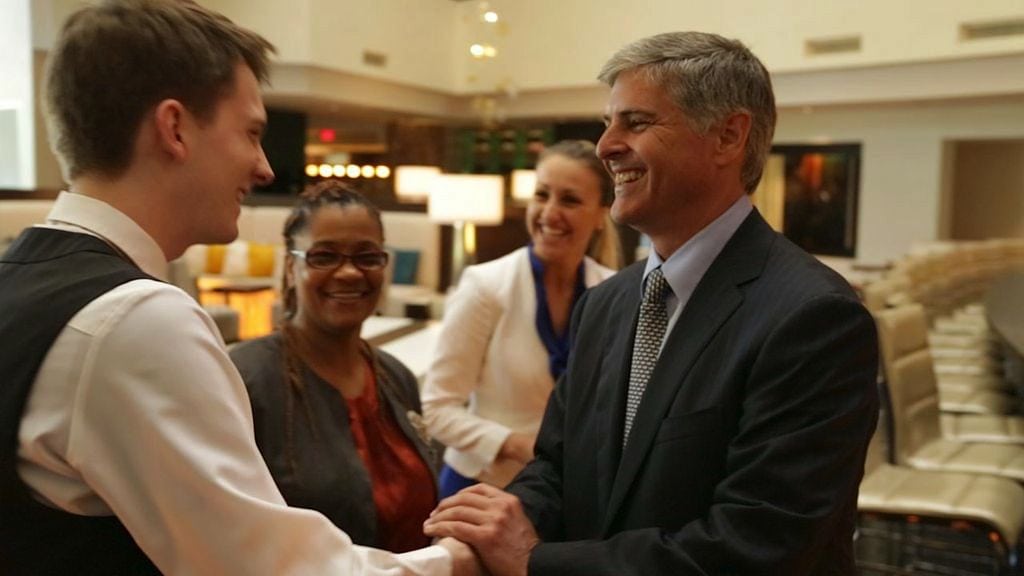Hilton CEO Looks to Airbnb as Hedge Against Power of Expedia and Booking.com

Skift Take
Most major hotel company CEOs are still insistent that their direct booking pushes are working, but they're candid about also maintaining ties with major online travel agencies like Expedia and Booking.com.
Hilton CEO Christopher Nassetta, when asked about the looming threat of Airbnb and short-term rentals recently, said he actually thinks Airbnb appears to be becoming more like an online travel agency (OTA) and that's actually a "good thing" for hotels because it forces the other companies like Expedia and Booking.com to be more competitive.
"Competition is a good thing," Nassetta said during Hilton's second quarter earnings call last month. "And there being more competition in the home-sharing business and more – by the way, you know my fundamental belief, is it's just a different travel occasion, trip occasion. We are not directly competitive with what they're doing. So, more competition, I think is good there.
"More competition – them morphing in whatever ways to feeling more like an OTA is a good – whether they do that or not, I don't know, not for me to say. But the more competition there is in any space, the better off we are, I think, because more competition in theory would help have the impact of driving pricing down and distribution costs down. So, I view that as a long game. Lots is going to go on over the next two years, five years, 10 years, 20 years. But as the competitive environment heats up, I think, the net result is good."
We're already seeing some signs of that transformation into a new breed of online travel agency from Airbnb. Last week, the company announced it now has 4 million listings on its platform, and that nearly half of those listings are instantly bookable, just like a hotel would be.
Nassetta's comments about competition aren't necessarily new. Hotel executives had previously expressed similar high hopes for TripAdvisor to compete with the online travel agencies and thereby lower the hotels' distribution costs. Whether that will actually be the case has yet to be proven, but it doesn't seem likely to occur anytime soon.
And while competition can be a good thing, in some cases, hoteliers themselves are also facing stiff competition from one another as well, especially as oversupply looms in many major markets such as New York City.
The latest round of second quarter earnings calls demonstrated a variety of hotel CEOs' viewpoints on the current hotel landscape, and the hotels' relationships with Expedia and Booking.com. Here's what a few others had to say about working with the online travel agencies, and how the hotels' direct booking campaigns are faring.
Hyatt: We're Not Leaving Expedia or Giving Up on Direct Bookings
Hyatt, of the major hotel companies, had been making headlines thanks to its somewhat dramatic contract negotiations process with Expedia, so CEO Mark Hoplamazian wanted to put any rumors to rest and address the issue head on:
"I wanted to address our distribution channel strategy," he said. "This strategy includes a focus on driving bookings through Hyatt channels so that we can build stronger relationships with our guests. For example, we recently extended My Hyatt Rate, our member discount, to new markets, optimized the hyatt.com booking path, and added new features to the World of Hyatt mobile app. At the same time, we recognize the value OTAs [online travel agencies] play in keeping Hyatt top of mind for guests who might not be frequent travelers or who otherwise have a reason to book through OTA sites.
"As such I want to share an update on the status of our approach to positioning Hyatt to utilize third-party distribution channels effectively and efficiently. We recently agreed to build on our existing relationship with Booking.com by implementing new initiatives intended to increase efficiency and flexibility, while driving demand. Additionally, we've had very productive discussions with Expedia and have agreed in principle on terms that optimize how we go to market and enhance our partnership. We expect that Hyatt Hotels will continue to be distributed on Expedia platforms without disruption while we finalize our agreement. We value these key partnerships with Expedia and Booking.com, and we remain focused on providing the best guest experience while we optimize outcomes for our hotel owners."
Hoplamazian also talked about Hyatt's new World of Hyatt loyalty program, which debuted in March to a somewhat lukewarm reception. The program, however, was ranked fourth as a top loyalty program in the latest U.S. News & World Report rankings.
"Overall," Hoplamazian said, "we're really pleased with how World of Hyatt is evolving and how customers are responding to it. Enrollments year-to-date are up significantly over the last year and program awareness has been trending more positively than we expected since the launch of the program. So, we've seen very positive member responses, both in terms of acquisition of new members, but also retention of members and their spend."
He also said Hyatt has seen "an increase in our My Hyatt rate or member discount rate" and that more than 70 percent of bookings made through the discounted member rate are from new or previously inactive World of Hyatt members.
"And since the launch of the program, about half of those new and previously inactive members have booked more than once, so we're seeing repeat business come from them," Hoplamazian added.
Of those hotels that have agreed to offer discounted room rates to loyalty members, he said they are also seeing an "improved RevPAR [revenue per available room] index."
Marriott: It's Easy to Click Around
Marriott CEO Arne Sorenson didn't directly address online travel agencies or Airbnb, but he did note that given the current distribution climate, it's becoming harder for hotels to keep rates high, just in a general sense, and that's not just because of Airbnb or the many booking sites out there.
"It's not particularly focused on home sharing or the disruptors in the space," he said. "It's much more about just the ubiquity of information. And I think with each passing year, it becomes simpler and simpler to know the rates at every single hotel, quite simply, within our own system. So, you've got that transparency on Marriott.com just as you do through other platforms. And with an increasing participation in the industry of the franchise community with individual pricing decisions that are being made by individual hotels, I think that's the world we live in. It does not mean that there won't be ability to drive rate in the future. We do have the ability to drive rate, certainly on midweek nights and others where the hotels are effectively full. But I don't think it's quite the environment we might have had in years past where probably there's a little bit more flexibility to do that."
Choice: Direct Booking Is Working for Us
Choice Hotels' incoming CEO Pat Pacious said that the company's loyalty program and Choice Privileges member rates are giving the company record numbers of direct business.
"The [loyalty] program recently surpassed 32 million members and has added more than 2.5 million new members already this year," he said. "Specifically, the Choice Privileges exclusive member rates booked directly on our website or mobile app provide the highest profitability to our franchisees and our increasing contributions generated by our proprietary reservation channels. Revenue from proprietary channels was 58.1 percent in the second quarter, that's up 360 basis points compared to the same period last year and is a new record for a second quarter."




